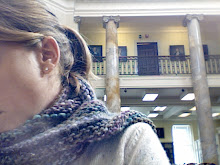 shh... covert photography at the Boston Public Library
shh... covert photography at the Boston Public Libraryas i've finally taken up residence at the american antiquarian society (a very strange place, indeed), i've had reason to reflect on my gendered scholarly activities of the last couple weeks. the first is of the last post, working in the houghton library, a place where it seems like donating your left kidney wouldn't be enough to win you the respect of the research staff. i find myself so tense when i'm there that i worry that i might be literally looking at the manuscripts wrong. i expect to be chided at any moment (as i was for wearing my coat in last week: "your coat constitutes a container and must be removed immediately!" sheepishly i tried to explain i had no coat and that the guilty coat at the end of the table was not mine. it didn't seem to matter (getting yelled at for doing nothing wrong reminds me, by the way, of getting yelled at in the Prague post office every week for a semester because i continually offered too much money for postage). perhaps unfairly, i think of the houghton as a very masculine -- and muscular -- institution, housed in a university whose former president reminded us all that women are innately less constituted for science. now compound this experience with a truly baffling conversation i had yesterday with a very well-known historian. we started talking about alcott and he went on and on about this anti-catholic story that Madeleine Stern refused to publish with the other thrillers because she didn't want her beloved little woman to suffer from a damaged reputation. the historian went on to describe the story -- which actually sounds quite fascinating -- in great detail. i told him that i was teaching a course on alcott next semester and that i'd love to use the story. this is where the tenor of the discussion changed. he could not, of course, give me the citation. he'd been hoping to publish something on the story for a couple years and couldn't possibly give me the damned name of the story before his non-existent article comes out. what?! as annoyed as i was about his reluctance, i tried to smile and keep up the friendly banter. he then went on with this other tale about this story-paper writer who published a dozen stories set at a coed academy in the 1860s. again he described the stories as essentially perfect for my dissertation. i was practically drooling when he talked about how the group of stories offer a radical critique of institutional learning in the period, etc. but then guess what? yup, when asked for the damned author's name, he gave me this stupid grin and refused. that piece would definitely need to be published before he could share those details. are you kidding? i was baffled. here i am a j.v. academic in the throes of dissertation misery and he's a senior professor in the 6th inning of his career and he won't share the fucking name of an author in fear of my scooping him. come on.
so as troubling as these two experiences were, i want to offer two others that set these in bold relief. last week i spoke with another historian who is working on a book-length study of the society that i've been investigating. i got her name from the curator at the rutherford b. hayes presidential library and emailed her several questions about anna ticknor and her society. we ended up having a two-hour phone conversation -- on her dime -- about her research and mine. she made a lot of great suggestions, questions i should be asking myself, and modes of analysis possible given the sources. she offered to send me her work and she encouraged me to call with other questions (she also, by the way, mentioned that helen horowitz -- a historian i really admire -- is also at work on a book about the society, reminding me that it was probably a good idea not to center the whole dissertation on it). i hung up the phone with her excited to have someone else to speak with, another person who actually cares about this work. likewise, i spent last wednesday at the Schlesinger library, hoping to look at Charlotte Perkins Gilman's school work from her time in the society. I approached the circulation desk with my normal anxiety about procedure, but was greeted by a lovely woman who asked a dozen questions about my research, showed me the manuscripts that i wanted to see, and offered to scan them for me (she even gave me a cd). she even thanked me for using the collection! it was like the houghton turned on its head. when i mentioned to her that the schlesinger was a real improvement on the houghton, she just smiled and said "that's what we've been told." So i ask, what's up with snooty libraries and greedy academics? I know that I often make dangerously loose claims about many things, and I don't mean to suggest that male academics are bad and women are good (that's silly, i know), but this week has suggested that perhaps we all in the field could be a bit kinder and more generous (or perhaps i should deliberately try to have experiences like the former so as to hasten my academic exit).
glad to have that off my chest. more from AAS to come....









